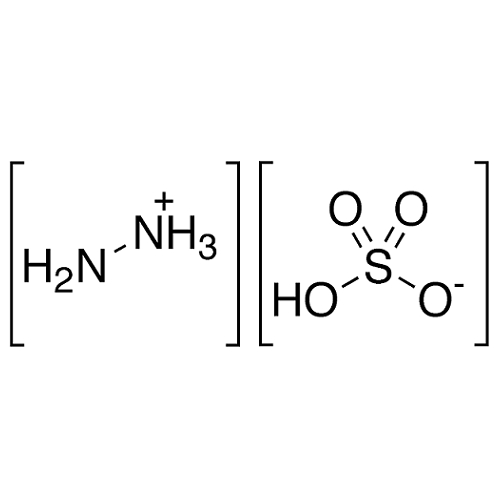Monographs licensed from Therapeutic Research Center, LLC
Scientific names: Hydrazine sulfate
Alternate names: Segidrin, Sehydrin, Sulfate d'Hydrazine, Sulfato de Hidracina
Actions: Antineoplastic, Endotoxic shock, Glucose and insulin, Gluconeogenesis, Hyper- or hypo-glycemic, Monoamine oxidase inhibiting, Neurological
Scientific names: Hydrazine sulfate
Alternate names: Segidrin, Sehydrin, Sulfate d'Hydrazine, Sulfato de Hidracina
Actions: Antineoplastic, Endotoxic shock, Glucose and insulin, Gluconeogenesis, Hyper- or hypo-glycemic, Monoamine oxidase inhibiting, Neurological
Hydrazine sulfate is a hazardous, colorless liquid with an ammonia-like odor. It's used for industrial purposes and sometimes as medicine. It's also unsafe.
Hydrazine sulfate might block certain chemical reactions in the body that can lead to malnutrition and muscle wasting.
People use hydrazine sulfate for cancer, weight loss in people with cancer, and other conditions, but there is no good scientific evidence to support these uses.
When taken by mouth: Hydrazine sulfate is possibly unsafe. It has been linked to cases of liver damage, seizure, coma, and death.
Special Precautions & Warnings:
Pregnancy and breast-feeding: Hydrazine sulfate is possibly unsafe for anyone, including those who are pregnant and breast-feeding. It has been linked to cases of liver damage, seizure, coma, and death.
Liver disease: Hydrazine sulfate might damage the liver. Taking hydrazine sulfate might make liver disease worse.
Surgery: Hydrazine sulfate might affect blood sugar control during and after surgery. Stop using hydrazine sulfate at least 2 weeks before a scheduled surgery.
NatMed Pro rates effectiveness based on scientific evidence according to the following scale: Effective, Likely Effective, Possibly Effective, Possibly Ineffective, Likely Ineffective, Ineffective, and Insufficient Evidence to Rate.
- Lung cancer. Adding hydrazine sulfate to chemotherapy does not improve quality of life or survival in most people with non-small cell lung cancer.
There is interest in using hydrazine sulfate for a number of other purposes, but there isn't enough reliable information to say whether it might be helpful.
- Cancer. Taking hydrazine sulfate by mouth doesn't seem to help treat various types of cancer.
Hydrazine sulfate has most commonly been used by adults along with chemotherapy. But it can be unsafe. Speak with a healthcare provider before using.
Interactions with pharmaceuticals
Isoniazid
Interaction Rating=Moderate Be cautious with this combination.
Isoniazid can cause liver damage in some people. Hydrazine sulfate can also cause liver damage. Using both isoniazid and hydrazine sulfate might increase the risk of liver damage.
Medications for depression (MAOIs)
Interaction Rating=Moderate Be cautious with this combination.
Hydrazine sulfate contains a chemical that affects the body. This chemical might increase the side effects of some medications used for depression.
Some common MAOIs include phenelzine (Nardil), selegiline (Zelapar), and tranylcypromine (Parnate).
Medications for diabetes (Antidiabetes drugs)
Interaction Rating=Moderate Be cautious with this combination.
Hydrazine sulfate might lower blood sugar levels. Taking hydrazine sulfate along with diabetes medications might cause blood sugar to drop too low. Monitor your blood sugar closely.
Interactions with herbs & supplements
Herbs and supplements that might lower blood sugar: Hydrazine sulfate might lower blood sugar. Taking it with other supplements with similar effects might lower blood sugar too much. Examples of supplements with this effect include aloe, bitter melon, cassia cinnamon, chromium, and prickly pear cactus.
Avoid using hydrazine sulfate with foods that contain a chemical called tyramine. Taking these products together can increase the risk of serious side effects. Tyramine-containing foods include avocado, banana, brewer's yeast, broad beans, caviar, aged cheese, aged red wine, herring, liver, and pickled meats.
vital.ly has licensed monographs from TRC Healthcare.
This monograph was last reviewed on 03/10/2024 10:00:00 and last updated on 23/09/2014 16:52:47. Monographs are reviewed and/or updated multiple times per month and at least once per year.
Natural Medicines disclaims any responsibility related to medical consequences of using any medical product. Effort is made to ensure that the information contained in this monograph is accurate at the time it was published. Consumers and medical professionals who consult this monograph are cautioned that any medical or product related decision is the sole responsibility of the consumer and/or the health care professional. A legal License Agreement sets limitations on downloading, storing, or printing content from this Database. No reproduction of this monograph or any content from this Database is permitted without written permission from the publisher. It is unlawful to download, store, or distribute content from this site.
Natural Medicines rates safety based on scientific evidence according to the following scale: Likely Safe, Possibly Safe, Possibly Unsafe, Likely Unsafe, Unsafe, and Insufficient Evidence to Rate. For more information about Natural Medicines’ Safety Rating System,
click here.
The Natural Medicines Effectiveness Ratings are assigned for specific indications. A product might be rated "Possibly Effective" for one condition, but be rated "Likely Ineffective" for another condition, depending on the evidence. For more info
click here.





